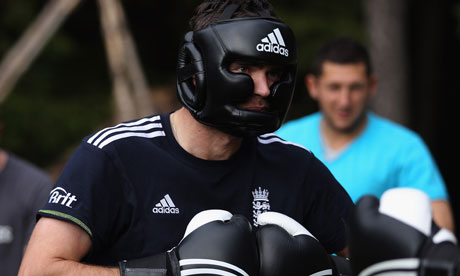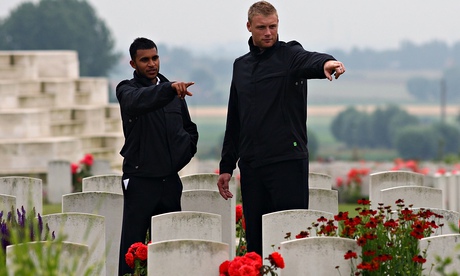Such is the appetite for bonding trips before Ashes series that it would be no surprise to discover that Australia had responded to England's ultra-physical Bavarian jaunt by abandoning their tour of India and deliberately trapping their entire squad down a Chilean mine.
Julie Gillard, the Australian prime minister, who needs improved poll ratings, could ape her Chilean counterpart by identifying herself with the subsequent rescue, her speeches drawing on her birthplace in a Wales mining town, before a rescue capsule shaped in the form of a Baggy Green pulled every player to safety.
Such an experience, as real life in Chile has so upliftingly proved, would be the ultimate expression of team unity. The time spent underground would justify players bowling in a Test in sunglasses, and that would be a first. England would know from the point that the first player reached the mine's surface that they had lost the Ashes.
The Spin admits that this is an entirely cynical take on bonding trips. A more serious analysis may follow and it may not be entirely to the taste of a large proportion of Guardianistas whose feelings were summed up by one colleague yesterday: "Bavarian boot camps? What a load of bollocks!"
This trip was shrouded in secrecy – players included – before it took place and it has become a monumental source of embarrassment since it was revealed that Jimmy Anderson damaged a rib in a boxing bout during the trip and that his fitness is in doubt ahead of the first Test in Brisbane.
One of the daftest ideas on a bonding trip, no matter how demanding it is designed to be, is to put Anderson in a boxing ring with anybody, even Chris Tremlett, who is alleged to have thrown the punch that has put England's Ashes plans in jeopardy. One trusts it will not prove to be Tremlett's lasting contribution to the series.
Anderson has many qualities, as a cricketer and a man, but the ability to withstand a punch is not one of them. He may be in the prime of life, he may be talented, he may be a potential Ashes winner, he may even have stepped into the ring for 30 seconds after a risk assessment that would have calmed the fears of the most stringent health and safety employee but as putative boxers go he is not the most resilient. It was an accident waiting to happen.
But even before news leaked out about Anderson's mishap, England's bonding trip had hardly met with universal approval. It had been arranged by Reg Dickason, England's Australian-born security adviser, and after the defection of the batting coach, Dene Hills, it was easy to joke that Dickason has revealed himself to be a double agent.
Andy Flower, England's coach, is mystified by the ambivalent English reaction to the whole exercise. The Spin is tempted to accept that it may have more merit than many suppose. Somebody has to argue the case, after all, the ECB having singularly failed in the task.
Why is there so much opposition to the boot camp? Partly, there is an element of media irritation in all this. The ECB's purblind refusal to reveal anything about the trip, as if it involved some top-secret military manoeuvres rather than just some abseiling and hiking, has goaded the media into a suspicious reaction. Wrap the trip in secrecy for no good reason and you invite scepticism. Not for the first time, the ECB's tendency towards unnecessary confidentiality has proved its undoing.
Second, it may be because although we recognise that international sport has an element of nationalism – war without the shooting and all that – we know that if this pride is not kept within the narrow, identifiable confines of a sporting contest then you are only one step away from the sort of ignorant Serbian thugs whose violence forced the abandonment of Serbia's Euro 2012 qualifier against Italy last week.
Third, it stems from the understandable belief that, yes, it can be a good thing to take highly paid sportsmen on enforced visits to second world war concentration camps at Dachau (England 2010) or to the first world war trenches of Gallipoli (Australia 2001), the horrors of which can never truly be conveyed, but when such visits coincide with Ashes tours they take on a hackneyed, stage-managed feel that to many of us devalues the experience.
Despite all this, the thought lingers: if you are a young cricketer about to take part in your first Ashes tour, perhaps irrespective of the routine nature of the visit, the experience is not hackneyed but fresh, not predictable but awe inspiring.
It is dangerous to dismiss the attempts of coaches and administrators to convey the sacrifices that have taken place outside the sports field. The proliferation of international cricket means England's players necessarily have to live narrow lives. It does no harm to put their endeavours into perspective.
The Spin can sense the Shane Warne tendency among you. Warne's captaincy record, restricted though it was, is viewed at Hampshire and Rajasthan Royals as successful. He has a proven ability to build team spirit, so his opinion matters.
"I am from the old school," Warne said. "If you want to gel everyone together lock them up in a pub and do not let anyone come in. Sometimes after a long summer of cricket players are better off spending time away from each other so they can recharge the batteries. Not a boot camp."
This solution, of course, would be no use whatsoever to the likes of Monty Panesar, a non-drinker who needs to be welcomed back into the fold. Then again, Monty may have been looking for religious reasons to avoid the hiking and the abseiling. Sadly, there is no evidence that Sikhism has ever forbidden activities that risk blisters.
Steve Waugh, Warne's former Australia captain, countered Warne's view in his autobiography, Out of My Comfort Zone. It is a considerable tome, one that could put Anderson out of cricket for good if he tried to pick it up. About 600 pages in, Waugh gets around to defending the Australian trip to Gallipoli that started all this off.
"To me, 'bonding' is an overrated term normally linked to reminiscing about past escapades with a truckload of grog on board," Waugh wrote. "I've had my fair share of these nights, and while they can create a few laughs and a better understanding of each other, the experience is shallow and soon forgotten. True bonding experiences stand the test of time and become part of you, and most certainly, visiting Gallipoli together had a profound effect on most of the squad."
The Spin finds Waugh's argument persuasive. England's team spirit is pretty sound, but after-match beers can become a predictable experience and players tend to split into the same old groups. Chats about football and women have passed many a contented night, but take players out of their comfort zones they do not.
Vince Lombardi, the American Football coach, once said: "Teams do not go physically flat, they go mentally stale." Many England players were flat enough after another long summer to want nothing more strenuous than a beach. That is precisely the reason they needed the opposite.
Flower's attempts to address the staleness, and seek a deeper team spirit, are praiseworthy. England's trip was not about instilling army-style virtues of obedience, respect and discipline. It was an attempt to travel beyond the superficial, to encourage players to discover more about themselves and gain a deeper understanding of how to relate to their team-mates, about when to encourage them, when to demand more, when to leave them alone.
Cricket is an individual game within a team environment and individuality has won many a match, but to understand the dangers of rampant individualism you have to look no further than Pakistan. The team ethic is weak, culturally so, and although talented players can create an illusion of togetherness in victory, with defeat comes blame and recriminations.
England's team spirit is not natural, it does not arise from a quick verse of Jerusalem and a pint. It must constantly be nurtured. Communication, initiative, individual sacrifice for the good of the whole: none of it comes automatically. In an age when the right to individual choice is emphasised ahead of responsibilities towards the communal good that fact is ever more evident.
To share an exhausting, intense experience can strengthen relationships in a way that can last for years. Just ask the Chilean miners.
This is an extract taken from The Spin, guardian.co.uk's weekly cricket email. You can sign up here











